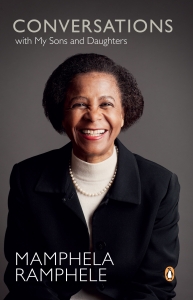
The book starts with this Sepedi idiom: 'Mabu a u tswitswe' (The soil has been stolen), which simply means something is terribly wrong with the current state of affairs in our country. These words are uttered by a young man during his conversation with Dr Ramphele. The young man seems overwhelmed by frustrations and anguish. He is facing the dilemma of speaking out against corruption at his workplace and jeopardising his great career prospects, or shutting up and focuing on reaching the upper echelons of his career. And somehow this story sets the tone for the rest of the book.
Over the years Dr Mamphela Ramphele has been known for speaking out against social ills in our society freely. She has the audacity to challenge those in power and tell them exactly what is on her mind. Conversations with My Sons and Daughters is precisely that: Ramphele just being her usual voice-of-reason self. The book addresses pertinent questions and issues which seem to be frustrating today’s youth. And those issues include corruption in the public sector, the culture of impunity, failure of leadership, lawlessness in our society, poor education and social pain amongst many. In a nutshell, Dr Ramphele is calling for our generation (today’s youth) to become advocates of change. She is calling for us to speak out and act against the culture of impunity. But is that even possible? I wonder.
What I liked about the book is that Dr Ramphele uses a lot of events which have taken place everywhere over the years as examples to illustrate her points. You endup spending more time trying to read extensively on these events, which are really just mentioned in passing when you read the book. You end up feeling as though you are indeed having a conversation with a grandparent. Apart from the fact that it might take you weeks to finish reading the book because her slow manner of articulating her views comes out so loudly and clearly in each and every line, the book is a fairly easy read.
After reading the book, people who like Dr Mamphela Ramphele will like her even more and those who dislike her will also remain the same. She doesn’t talk about how white South Africans are still wealthier than their fellow black citizens, how they benefited from the injustices of the past, or why they are still at the helm of the economy. She doesn’t talk about the fact that loads of utterly poor people are still black but she does bash the ANC for everything that is wrong with this country. It's their fault, she seems to be suggesting. She does not talk about the ownership of mines in the country but she does bash Julius Malema for turning away potential investors by his utterances on the nationalisation of mines. She is not apologetic and speaks her mind without fear but with a certain annoying level of obsession with the ANC.
Published by Penguin, Conversations with My Sons and Daughters is conversational, educational, absorbing, and informative and Dr Mamphela Ramphele is absolutely daring, as always!
This review originally appeared here.
Find out more about Conversations with My Sons and Daughters.
Read an extract from the book.






